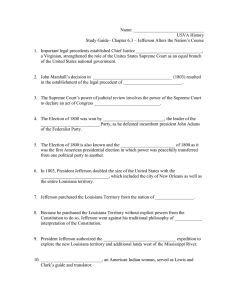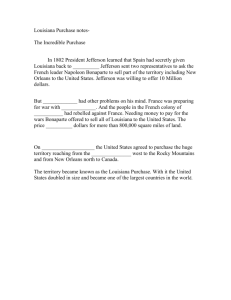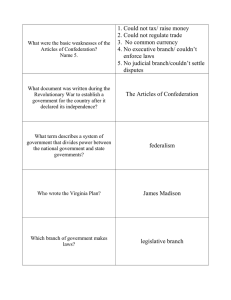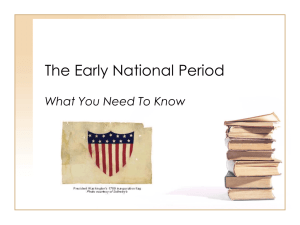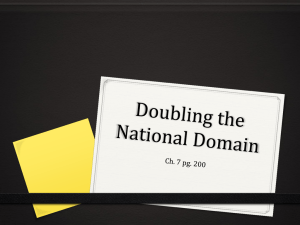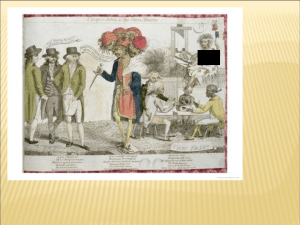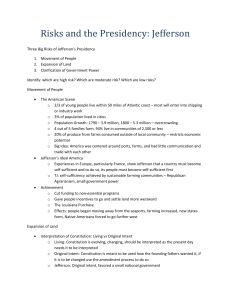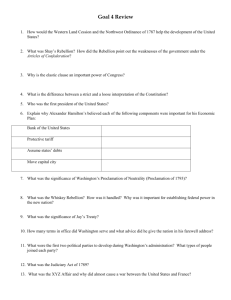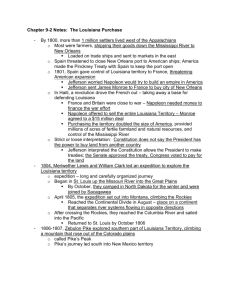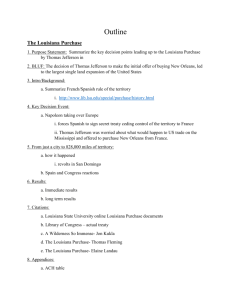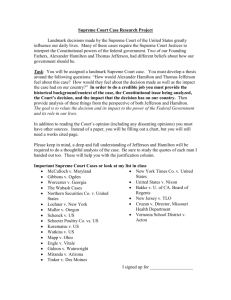Early Republic - Hicksville Public Schools / Homepage
advertisement
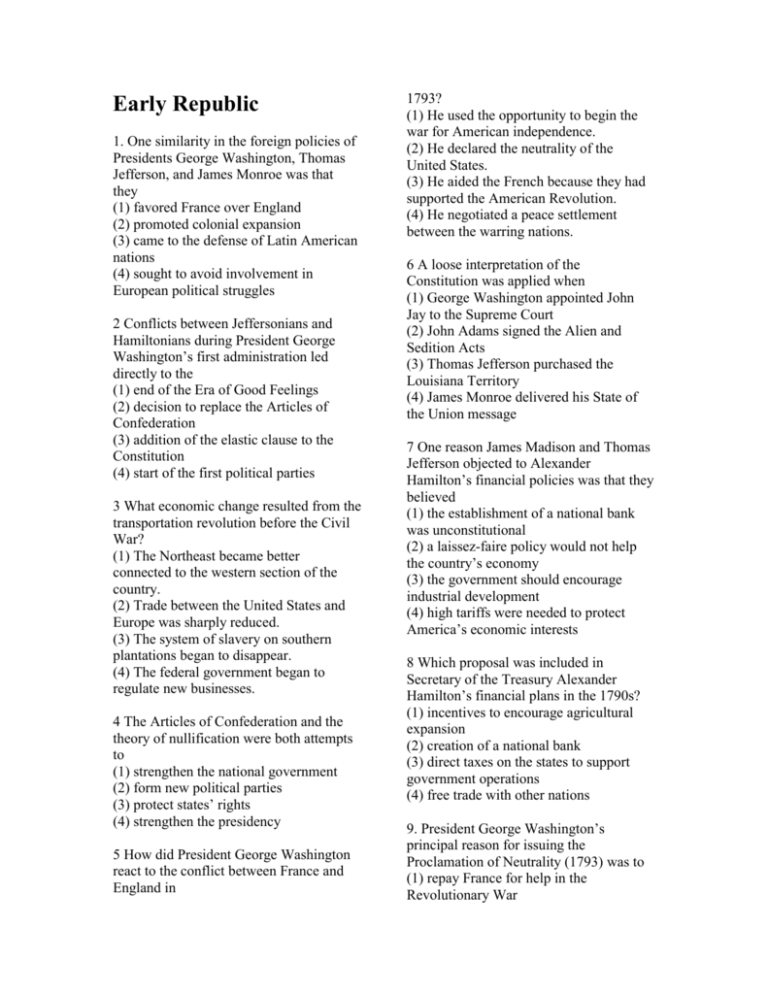
Early Republic 1. One similarity in the foreign policies of Presidents George Washington, Thomas Jefferson, and James Monroe was that they (1) favored France over England (2) promoted colonial expansion (3) came to the defense of Latin American nations (4) sought to avoid involvement in European political struggles 2 Conflicts between Jeffersonians and Hamiltonians during President George Washington’s first administration led directly to the (1) end of the Era of Good Feelings (2) decision to replace the Articles of Confederation (3) addition of the elastic clause to the Constitution (4) start of the first political parties 3 What economic change resulted from the transportation revolution before the Civil War? (1) The Northeast became better connected to the western section of the country. (2) Trade between the United States and Europe was sharply reduced. (3) The system of slavery on southern plantations began to disappear. (4) The federal government began to regulate new businesses. 4 The Articles of Confederation and the theory of nullification were both attempts to (1) strengthen the national government (2) form new political parties (3) protect states’ rights (4) strengthen the presidency 5 How did President George Washington react to the conflict between France and England in 1793? (1) He used the opportunity to begin the war for American independence. (2) He declared the neutrality of the United States. (3) He aided the French because they had supported the American Revolution. (4) He negotiated a peace settlement between the warring nations. 6 A loose interpretation of the Constitution was applied when (1) George Washington appointed John Jay to the Supreme Court (2) John Adams signed the Alien and Sedition Acts (3) Thomas Jefferson purchased the Louisiana Territory (4) James Monroe delivered his State of the Union message 7 One reason James Madison and Thomas Jefferson objected to Alexander Hamilton’s financial policies was that they believed (1) the establishment of a national bank was unconstitutional (2) a laissez-faire policy would not help the country’s economy (3) the government should encourage industrial development (4) high tariffs were needed to protect America’s economic interests 8 Which proposal was included in Secretary of the Treasury Alexander Hamilton’s financial plans in the 1790s? (1) incentives to encourage agricultural expansion (2) creation of a national bank (3) direct taxes on the states to support government operations (4) free trade with other nations 9. President George Washington’s principal reason for issuing the Proclamation of Neutrality (1793) was to (1) repay France for help in the Revolutionary War (2) protect United States interests in the Caribbean area (3) safeguard the newly won independence (4) punish the British for failing to withdraw from American territory 10. The Supreme Court decision in Marbury v. Madison (1803) was important because it (1) established the principle of judicial review (2) led to the reelection of President Thomas Jefferson (3) showed that the states were stronger than the federal government (4) proved that the legislative branch was the most powerful branch of government 11. During the first half of the 19th century, the construction of canals and roads led to the (1) expansion of trade between midwestern farmers and eastern merchants (2) growth of plantation agriculture in Texas and New Mexico (3) severe economic decline of the South (4) bankruptcy of several railroad companies in the Mississippi Valley 12. Thomas Jefferson opposed Alexander Hamilton’s plan to create a national bank primarily because the plan would (1) weaken the nation’s currency (2) increase the national debt (3) promote the interests of farmers (4) depend on a loose interpretation of the Constitution 13. “ ’Tis [It is] our true policy to steer clear of permanent alliances with any portion of the foreign world. . . .” — President George Washington, Farewell Address, 1796 The United States was able to follow this advice from President Washington for several decades primarily because of (1) industrial and agricultural selfsufficiency (2) strong support from other Western Hemisphere nations (3) geographic isolation from Europe (4) peaceful relations between the European powers 14. The completion of the Erie Canal in the early 19th century aided the economic development of the United States by (1) supplying water for the irrigation of western farms (2) lowering the cost of shipping goods from the Midwest to the Atlantic coast (3) providing a shipping route for cotton from the South to Europe (4) supplying waterpower for running factories and mills 15. Which action during Washington’s administration led to the Whiskey Rebellion in western Pennsylvania? (1) passage of a new excise tax (2) establishment of a presidential cabinet (3) creation of the Bank of the United States (4) ban on slavery in the Northwest Territory 16. The foreign policies of George Washington, Thomas Jefferson, and James Monroe were similar in that they each (1) supported wars against England (2) failed to acquire new territory (3) attempted to avoid involvement in European affairs (4) aided the French in return for their help during the Revolutionary War 17. Acquiring New Orleans as part of the Louisiana Purchase was considered important to the development of the Mississippi and Ohio River valleys because the city (1) provided protection from attacks by the Spanish (2) provided migrant workers for river valley farms (3) served as a port for American agricultural goods (4) served as the cultural center for the nation 18. One major reason that Alexander Hamilton proposed a national bank was to (1) improve the economic position of the United States government (2) help state governments collect taxes (3) make loans available to owners of small farms (4) reduce foreign investment in the United States 19. A major foreign policy success of President Thomas Jefferson’s administration was the (1) purchase of the Louisiana Territory (2) support for the Alien and Sedition Acts (3) victory in the war of 1812 (4) passage of the Embargo Act 20. The Supreme Court decisions in Gibbons v. Ogden and Northern Securities Co. v. United States were based on the federal government’s power to (1) issue patents (2) control the stock market (3) regulate interstate commerce (4) encourage technological development 21. How did Alexander Hamilton’s financial plan affect the economy of the United States during the 1790s? (1) National tax revenues decreased. (2) High tariffs increased foreign trade. (3) Treasury policies contributed to widespread inflation. (4) The newly created Bank of the United States helped stabilize the economy. 22. One result of the purchase of the Louisiana Territory (1803) was that the United States (1) acquired California from Spain (2) gained control of the port of New Orleans (3) ended border conflicts with British Canada (4) annexed Florida 23. The decision in Marbury v. Madison (1803) was significant because it established that the Supreme Court (1) had limited powers over state courts (2) had the power to choose its own members (3) could declare a federal law unconstitutional (4) could impeach the president and other government officials Base your answer to question 24 on the passage below and on your knowledge of social studies. … Europe has a set of primary interests which to us have none or a very remote relation. Hence she must be engaged in frequent controversies, the causes of which are essentially foreign to our concerns. Hence, therefore, it must be unwise in us to implicate [connect] ourselves by artificial ties in the ordinary vicissitudes [changes] of her politics or the ordinary combinations and collisions of her friendships or enmities [antagonisms].… — President George Washington, Farewell Address, 1796 25. According to the passage, President Washington believed that the United States should (1) seek financial aid from European nations (2) end all existing European friendships (3) avoid involvement in the political disputes of Europe (4) discontinue commercial relations with Europe 26. Many critics of the electoral college system point out that it (1) penalizes the states with the smallest population (2) encourages the formation of minor political parties (3) grants too much influence to the United States Senate (4) might not select the candidate with the largest number of popular votes 27. The establishment of judicial review in Marbury v. Madison (1803) gave federal courts the authority to (1) decide whether a law is constitutional (2) create lower courts (3) approve foreign treaties (4) appoint judges to lifetime terms 28. A major reason for purchasing the Louisiana Territory (1803) was to (1) gain access to the Ohio Territory (2) remove the British from the borders of the United States (3) secure control of the port of New Orleans (4) open the Rocky Mountains to miners
